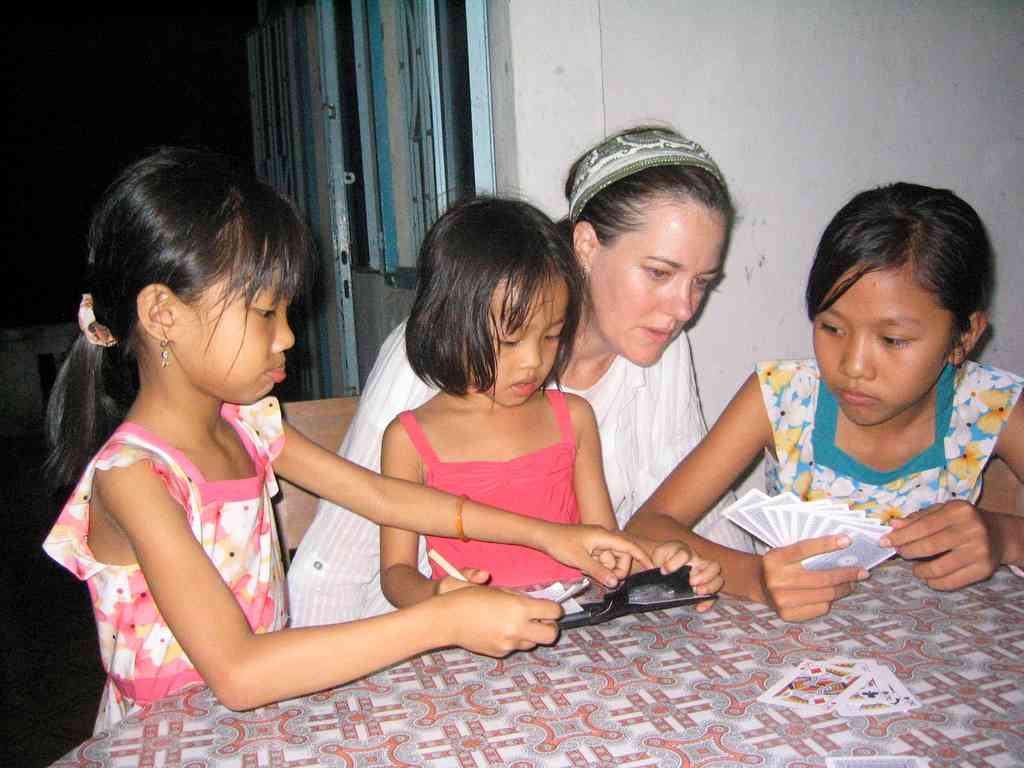I strongly believe the best way to experience foreign countries is to stay with hosts when you travel. People always talk about how it’s great to ‘travel like a local’, and the best way to do that is to stay with a local, in a local home. They can help you see your destination through their eyes, talk about what daily life is like in the area, and always point you towards the best places to see and things to do, while also giving you the most accurate information concerning any possible safety risks.
I was fortunate enough to experience staying with host families for two months in Brazil and three months in South Africa, while taking part in a study abroad program. Because of the circumstances under which I went, arrangements with the families were made easily through the program’s directors and their pre-existing connections. However, finding a host to stay with if you’re just traveling solo or on vacation can be much harder. So in order to help those wishing to travel this way, something I strongly recommend, I have compiled a list of the best resources I have found for finding local hosts, as well as some tips for how to interact in a host environment.
How to Find a Host/Homestay
Assuming you have no distant relations or old friends in the country you are visiting, you will need to find a host to stay with. While trying to find & book a homestay, keep these tips in mind:
- Bring a gift or help out around the house to show some appreciation as a guest.
- Look for host profiles with lots of information, pictures, and especially good recommendations from previous guests.
- Make sure you are clear on what your host expects from you before you travel (i.e. help with the house, cooking duties, etc.)
- Always make sure you understand exactly where it is you will be staying. Don’t get there expecting to sleep in a guest room and find a mat on the living room floor instead.
With that in mind, here are some websites to use for your search:
Couchsurfing.com – This is probably the best known site for finding local hosts, and with good reason. Becoming part of the couchsurfing community means you can also choose to open your home up to travelers (though you are not required to), and besides finding hosts, you can also find other people in your destination to meet up with or just show you around, even if you don’t stay with them. It’s free to register for the site, and free to stay with a host.
Staydu.com – This site gives travelers the option of exchanging money (usually at a cheap rate), housework, or other services for accomodation in a foreign country. This can range from helping the host learn your language to farming to offering your house for hosting at a future date. If you’re looking at a long stay in destinations that have a definite busy season (i.e. Mediterranean coast in the summer, Caribbean islands mid-December to mid-April), you can find a lot of business owner hosts at Staydu who will offer you free room & board if you help them run their bar/restaurant/hotel during the busy season. If you want to combine some work with travel, or want to travel long-term and feel more comfortable working in exchange for a room, use this site. Sometimes, you will get lucky and find a host offering their services for free!
Homestaybooking.com – Most hosts here require payment from guests. However, this is one of the best sites for finding the host that is most well-suited to you and your needs. The hosts have detailed profiles that include the following information: interests, family members & ages, home’s distance from city center & transportation, and other details such as availability of Wi-Fi and tolerance of smoking in the household. Though you will pay for your stay by using this site, usually you will also get equivalent higher-quality accommodation, as many people offer well-furnished guest rooms rather than a couch or air mattress. Put up your profile including your requirements regarding meals & cleaning in your homestay, and match up with one of the many hosts on this site.
Educatorstravel.com – If you currently work or have ever worked in education, this is definitely a site you should check out. Stay at other peoples’ homes for $45 a night for 2, and if you offer your own home on the site to host travelers, you get credits that you can use to earn free travel. There is, however, a $36 per year membership fee.
Helpx.net – The hosts here are looking for extra help with their home, family, or business in exchange for providing accomodation for travelers. Most of the hosts are families, many with children, so if you are a young traveler who prefers to stay with people your own age, this is probably not the best site for you. On the other hand, if you want to help a family with tutoring or babysitting, or work on their farm or in their hostel, check this site out. You can acquire new skills while you travel, and therefore boost your resume instead of leaving a gap, or improve skills in these areas you already have.
If you want even more resources, check out the following sites, but know that the host families on the following sites are not screened: Homestay Finder, Homestay Web, Homestay International
Guide to Researching Prospective Host Families

Bo Kaap neighborhood in Cape Town, South Africa – Where I spent 1.5 amazing months living with a host family
Besides ascertaining some basic information when trying to decide on a host, like the accomodations in the guest room and their hobbies, there are certain questions you should always ask to get a better idea of how well you will fit into the new household.
- When you’ve found a prospective host family, ask what their daily routine is usually like, so you can see how well it meshes with your itinerary. Then discuss any extra expectations they may have from you while you’re staying with them, regarding things like housework or even keeping an eye on their kids.
- Gauge how much interaction your host expects. Some people will give you a few pointers about their city and otherwise let you go about your day while keeping their distance, acting much like a landlord with a renter. Others will enthusiastically welcome you and want to spend the whole day together. Depending on how close you want to get, pick the host style that suits you best.
- If you want to see the city through local eyes but not sacrifice too much of your personal freedom, try to find a host who lives alone. Living with families means respecting kids’ bedtimes and schedules, not to mention that young children will often not understand your need for privacy, and may try to interact with you often.
- Ask your host what their sleep schedule is usually like. This can make or break the quality of your stay, but many people gloss over this information and few host profiles, if any, require them to fill out such details. But always ask, because it sucks having to spend half your day as ‘quiet time’ because your host is sleeping, or waking up late to find your host has already done all the chores you were supposed to take care of, and then feeling awkward and guilty. If your host always sleeps at 9 PM and you want to hit the bars a couple of times, have a conversation about possibly staying at a nearby motel for those days.
Rules for Living in a Homestay
If you do end up living in a homestay on your travels, you must realize that you will experience very different conditions than you would at a hotel. You may have a little less freedom to do what you want, you will need to adjust to another person’s routine, and you must respect the family and/or household rules. Some basic things to keep in mind:
- Know your host’s cultural norms and religious restrictions! Research them beforehand so you don’t show up uninformed. This helps you avoid major faux-pas like gifting a bottle of wine to a conservative Muslim family, or giving your Brazilian host mother the ‘OK’ hand gesture only to see her horrified expression when she interprets it as a raised middle finger (seriously, don’t EVER do this gesture in Brazil – index and thumb forming a circle, other fingers pointing up).
- Always OBSERVE and imitate. In order to fit in with your host, take your cues from the behavior of all the members of the household. Observe, and then follow their lead, even with little things. Are they talkative at mealtimes or absolutely silent? How formally or casually do they address each other? Good observations will help you fit in faster and feel more at home with your hosts.
- If you do live with a family, never get sucked into family disputes or parent-child conflicts. You may think this is a no-brainer, but if you get close to a child in the household, they may ask you to take their side in an argument with their parents, especially if it’s a stricter culture and they feel you may better understand their position than their parents do. This is a surefire way to piss off the parents and either find yourself out on the street, or feeling extremely awkward and uncomfortable for the rest of your stay.
- Pick up after yourself – leave your space exactly as you found it, or even cleaner, if you can. This is the simplest rule that guests break all the time and drives hosts up the wall. It doesn’t matter if your own house looks like it should be on ‘Hoarders’. You are competely entitled to your messiness while at home, but different rules apply when someone is being gracious enough to accept you as a guest. Trust me, I get that it’s a challenge; I’m the kind of person that will pile my laundry on chairs and only do it when I have no place to sit anymore, but I am always careful to be extra organized and neat in other peoples’ homes.
- Getting involved with hosts is usually a bad idea. A rarer occurrence, but something that needs to be said. You’re staying with a cute, single host, you’re a single traveler, and after an especially long night at the bar, things happen. But if at all possible, try to avoid it. Awkward situations could develop, and if someone gets hurt, you could end up temporarily homeless in your destination with your things thrown out the window beside you.
- If you do want to stay out really late on some nights, discuss staying at nearby lodging beforehand with your host. This way, you won’t interrupt their schedule or wake them up at night, while still getting to see some of the city’s nightlife. Discussing this is important, because choosing to stay at a hotel without informing your host is rude and irresponsible, and may lead to them worrying about you and trying to find where you’ve gone.
- Respect your host’s economic situation. Sometimes when travelers from wealthy Western countries stay with less affluent host families in poorer countries, they can forget that what seems like a minor cost to them is actually quite a burden on their hosts. Don’t use resources as carelessly as you might at home; this includes everything from water to toilet paper. Also, while at your homestay, try to avoid wearing flashy watches, jewelry, or clothes that cost more than your host family makes in a year. They probably won’t say anything, but it’s just a shitty thing to do. Don’t be that person.
This might seem like a lot to keep in mind, but after 2-3 days in your new home, chances are you will easily fall into the daily routine of your hosts. All in all, staying with host families led to some wonderful experiences while traveling abroad, because I got to see parts of the city I never would have otherwise, and understand a lot more about the local culture and society than I ever thought I could. So try living in a homestay next time you travel…you’ll be surprised at how much richer your trip experience will be.
For more on the pros & cons of homestay life, check out this article from Go Overseas.
Have you lived in a homestay? Would you do it again? Share your experiences below!


